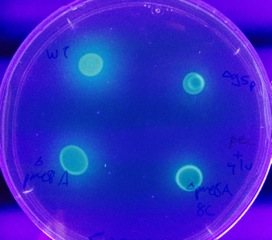
The cells of uni- and multicellular organisms carry out their biological functions through various types of molecules. Understanding how living organisms use information encoded by their genome or provided by the environment to synthesize and regulate these molecules and the mechanisms by which molecules interact to carry out their diverse functions is a fundamental problem in Biology. The biochemistry of the cell is the basis of many complex processes in the body, and its understanding will pave the way for targeted interventions and treatments for diseases. Classical approaches complemented with emerging “omics” techniques to further probe the complexity of these processes have enabled fundamental discoveries in the area of molecular biology. Students enrolled in the Genetics, Biochemistry and Microbiology (GBM) area of specialization will engage in cutting edge research using these various methodologies to investigate original questions under the guidance of the faculty listed below. In addition, upon consultation with their thesis advisor and committee, students will choose three or more courses from the following list.
Courses of interest
● Bacterial Physiology (BIOL 611)
● Microbial Systems Biology (BIOL 612)
● Advanced Topics in Cell Biology (BIOL 620)
● Immunology (BIOL 625)
● Approaches to Molecular Biology (BIOL 626)
● Introduction to Developmental Biology (BIOL 642)
● Advanced Topics in Developmental Biology (BIOL 643)
● Development and Cancer (BIOL 644)
● Signal Transduction (BIOL 645)
● Neurobiology (BIOL 651)
● Vision Science (BIOL 654)
● Plant Molecular Biology (BIOL 656)
● Genome Science (BIOL 686)
● Courses from other AOS
Faculty
Charles Bieberich: Cancer biology
Rachel Brewster: Brain developmental and metabolism
Kathleen Cusick: Microbial ecology; Harmful algal blooms
David Eisenmann: Wnt signaling and cell fate specification
Philip Farabaugh: Molecular genetics of translational accuracy
Jeffrey Gardner: Bacterial physiology; Systems and synthetic biology
Erin Green: Epigenetic regulation of the genome
Jeff Leips: Genetic basis of aging
Daniel Lobo: System genetics and signaling networks
Hua Lu: Mechanisms of plant immunity
Stephen Miller: Development of green algae; algal biotechnology
Achuth Padmanabhan: Cancer biology
Harold Schreier: Microbial genetics, ecology, and physiology
Michelle Starz-Gaiano: Regulation of cell motility
Fernando Vonhoff: Neurodevelopment and degeneration